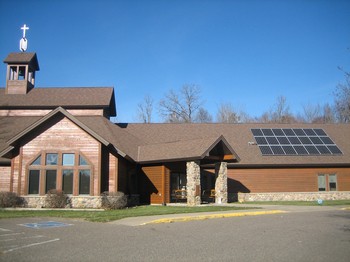Caring for the earth is important business at Crosslake Presbyterian Church here.
It’s so important that the Rev. Roger Grussing, pastor emeritus and chair of the congregation’s Energy Stewardship Task Force, can quickly recite five ways the congregation is demonstrating earth stewardship.
The congregation plans to celebrate its earth stewardship with an “Earth Care Fair” Saturday, April 26, followed by the dedication of its solar electricity generating system Sunday, April 27.
Situated in the middle of Minnesota’s lake country, the congregation built its worship facility in 2001, and from the beginning of construction had conservation in mind. It installed insulation, windows and lighting that exceeded code requirements.
That was the first of five earth stewardship efforts. The congregation also heats and cools the facility with a geothermal system, purchases wind generated electricity units from its local power company, and has retained neighboring forest land to capture carbon and emit oxygen.
The fifth element ― the solar energy system installed last fall ― will be dedicated this spring.
None of the systems has come without financial cost, but that’s not what drives the congregation. “You have to balance resources against a sense of responsibility,” Grussing said.
Grussing, who was the congregation’s organizing pastor, said, “All decisions, from personal to institutional, rest on the fulcrum of expense on the one hand and the positive value on the other.”
In the case of retaining the forest land, it wasn’t even a case of spending resources. It was a case of not selling 10 acres of land covered in forest. Rejecting the sale meant reducing the congregation’s carbon footprint ― and “it’s measurable,” Grussing said.
But when it came to installing its 21-panel, 5-plus kilowatt solar array on the facility’s south-facing roof, it wasn’t always an easy sell.
“A lot of people thought it was ridiculous,” said the Rev. Kate Stangl, the congregation’s minister and a staunch supporter of the project. The congregation had to be convinced of the need for the project and the impact it could have on the environment and on the congregation.
A $4,000 grant from Clean Energy Resource Teams (CERTs) ― a statewide partnership with a shared mission to connect individuals and their communities to the resources they need to identify and implement community-based clean energy projects ― funded a study titled “The New Noah Project” that looked at the effect of the congregation’s environmental stewardship in the past and the potential impact of the solar-energy project.
That grant, plus support from the Presbytery of Minnesota Valleys, other Presbyterian congregations, and from within the congregation enabled the Crosslake session to approve the project last August and sign a contract with Rural Renewable Energy Alliance of Pine River, Minn., for installation of the system.
The total cost of the project was about $24,000. There have already been days when the congregation sells energy back to Crow Wing Power, its local energy company. The task force thinks the investment in solar will eventually reap greater financial benefits.
But that’s not really the point, Grussing pointed out. It’s more a sense of faith-based responsibility and response to climate change.
Now it’s time to celebrate.
The congregation’s “Earth Care Fair” will run from 4 to 7 p.m. April 26 at the church and feature numerous displays and presentations that identify ways families and institutions can constructively respond to climate change. Michael Duvall, manager of ecological and water resources for the Minnesota Department of Natural Resources, will speak about the impact of climate change on fish, game, trees and water.
On Sunday morning at 9, Carol Robb, author of Wind, Sun, Soil, Spirit: Biblical Ethics and Climate Change, will lead a public forum at the church that will look at ecological ethics from a theological perspective. In her book, Robb, professor of biblical ethics at San Francisco Theological Seminary, relates the Bible to the ethics of current environmental policy. The forum will be followed by worship at 10:15.
Duane Sweep is associate for communications for the Synod of Lakes and Prairies. He is a frequent contributor to Presbyterian News Service.

